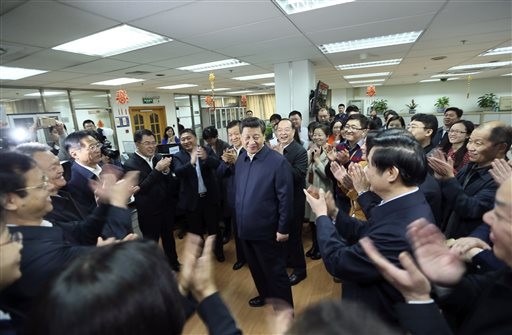Popular Reads
Top Results
Can't find what you're looking for?
View all search resultsPopular Reads
Top Results
Can't find what you're looking for?
View all search resultsChina set to pass law tightening controls on foreign NGOs
Change text size
Gift Premium Articles
to Anyone
 In this Feb. 19, 2016 file photo released by China's Xinhua News Agency, people applaud as Chinese President Xi Jinping, center, talks with editors in the general newsroom of the People's Daily in Beijing. The ruling Communist Party has long exercised heavy-handed direction over news media, but recent events speak to a further tightening of ideological controls. President and party leader Xi Jinping set the tone with visits in February to the official Xinhua News Agency, the party-controlled People’s Daily newspaper and state broadcaster CCTV during which he stated that absolute loyalty to the party was the media’s highest priority. Negative responses to Xi’s visit were censored on China’s once-vibrant social media. One outspoken critic, real estate magnate Ren Zhiqiang, had his accounts suspended. (Xinhua via AP/Lan Hongguang)
In this Feb. 19, 2016 file photo released by China's Xinhua News Agency, people applaud as Chinese President Xi Jinping, center, talks with editors in the general newsroom of the People's Daily in Beijing. The ruling Communist Party has long exercised heavy-handed direction over news media, but recent events speak to a further tightening of ideological controls. President and party leader Xi Jinping set the tone with visits in February to the official Xinhua News Agency, the party-controlled People’s Daily newspaper and state broadcaster CCTV during which he stated that absolute loyalty to the party was the media’s highest priority. Negative responses to Xi’s visit were censored on China’s once-vibrant social media. One outspoken critic, real estate magnate Ren Zhiqiang, had his accounts suspended. (Xinhua via AP/Lan Hongguang)
C
hina's national legislature is poised to vote this week on a draft law criticized by overseas governments for tightening controls over foreign non-governmental groups by bringing them under direct police supervision.
The proposed law requires that such groups accept police supervision and state the sources of their funding and how their budgets are spent, the official Xinhua News Agency reported Tuesday.
Police would also be permitted to interview administrators and force Chinese partner organizations to terminate any program considered a threat to state security, Xinhua said. Groups seeking to "subvert the state and split the nation" would be banned, it said.
The proposed legislation has drawn criticism from U.S. and European officials and business and academic organizations concerned it would severely restrict the operations of a wide range of groups.
Several hundred NGOs founded, run or financed by foreigners are now operating in China in fields ranging from animal protection to human rights law.
Most are registered with the government as branches of formal Chinese academic or social organizations, while others operate in a legal gray area that leaves them vulnerable to crackdowns by the security forces.
In one recent example, China in January released and immediately deported a Swedish man it accused of training and funding unlicensed lawyers in the country.
The third and final draft of the foreign NGO law is expected to be voted on by the National People's Congress Standing Committee at its bi-monthly meeting this week. The committee handles the bulk of the congress' legislative work outside of the full body's annual two-week session.
Cooperative agreements between Chinese and overseas colleges, hospitals and science and engineering research institutes will continue to be handled under separate regulations.
While it would allow foreign NGOs to operate one-time or occasional programs in China, the new law would require their Chinese partners to obtain official approval and forbid them from hiring additional Chinese staff.
Of greatest concern to foreign groups and governments has been the naming of the Public Security Ministry as the overall body to govern foreign NGOs, something seen as casting those groups under undo suspicion. Those critics have suggested that the Civil Affairs Ministry would be a more logical oversight body.
Critics fear the law may lead to an onerous degree of scrutiny over administrators, with Xinhua saying police could bring investigations at will and demand the termination of any cooperation program "considered to undermine state security."
"Overseas NGOs, which engage in illegal activities including those to subvert the state and split the nation, will be banned from operating on the mainland," Xinhua said.









